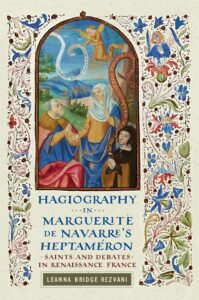by Leanna Bridge Rezvani
AuthorLeanna Bridge Rezvani
HardbackNovember 2025 • ISBN 978-1-64453-401-4 • $150.00
PaperbackNovember 2025 • ISBN 978-1-64453-400-7 • $39.95
* E-Book AvailableOrder OnlineSeriesThe Early Modern Exchange
Marguerite de Navarre was one of the most educated and powerful women of Renaissance Europe. Along with her active engagement in politics and religion, she was a patron of the arts and a prolific writer. The Heptaméron, her celebrated collection of tales and debates, offers readers invaluable insights into diverse aspects of sixteenth-century French society. Scholars of Marguerite have written extensively on the complexities of her religious thought. While her connection to the evangelical reform movement has received significant scholarly attention, the influence of Catholic narrative tradition on the Heptaméron has been underexplored. Through an analysis of Marguerite’s tales together with literary works, religious writings, and visual images of the saints, Hagiography in Marguerite de Navarre’s Heptaméron reveals the important relationship between the Queen of Navarre’s text, hagiographic tradition, and various sixteenth-century controversies. By contextualizing the Heptaméron within the theological and literary debates of Renaissance France, this volume illustrates how Marguerite both borrowed from and revised hagiography to lend greater authority to her writing, to advocate on behalf of women, and to craft an innovative response to polemics about gender, religion, and the cult of saints.
About the Author
Leanna Bridge Rezvani is a Lecturer in French at MIT. She received a Ph.D. from Boston College and has published articles on Marguerite de Navarre, Madame de Lafayette, and Marguerite de Roberval. In addition, she has developed websites on Marguerite de Roberval, the Heptaméron, and La Princesse de Clèves. She also created and maintains the website for the Marguerite de Navarre Society.
Reviews of Hagiography in Marguerite de Navarre’s Heptaméron: Saints and Debates in Renaissance France
“
"In her thorough analysis of saints in Marguerite de Navarre’s
Heptaméron, Leanna Bridge Rezvani considers recent scholarship on the subject and a variety of other sources (e.g., theological writings, books of hours, artworks, personal correspondence, the liturgical calendar, and pilgrimage sites) to provide fresh, new insights into the queen’s religious beliefs, especially concerning the Reformist and Catholic controversies on the cult of saints, pilgrimages, and women’s roles in the church. Rezvani skillfully demonstrates how, by comparing the suffering of her female characters to saints in several nouvelles and offering divergent viewpoints in the discussions among her storytellers, Marguerite enhanced her authority as a writer, served as a moderate voice in theological debates of the time, and provided a pro-woman response to misogynistic works in the Early Modern debate on the social status of women, known as the
querelle des femmes."
”
- Judy Kem, author of Pathologies of Love: Medicine, and the Woman Question in Early Modern France (20190
“
Saints and Debates thoughtfully argues that Marguerite de Navarre’s revisionist hagiography can be read as a fictionally enacted compromise between the author’s deep commitment to Catholic practices and traditions, and her insistence on representing the physical violence and clerical corruption that harmed women in Renaissance society. Bridge Rezvani’s detailed readings of various saint’s lives in the novellas and the frame narrative provide important evidence of some of Marguerite de Navarre’s most important concerns: showing that women have the capacity for spiritual leadership, that it is possible to remain true to one’s spiritual values and also question traditional hierarchies, and that the practice of female communication in difficult circumstances can be a powerful force for good.
”
- Nora Martin Peterson, author of Involuntary Confessions of the Flesh in Early Modern France (2016)

